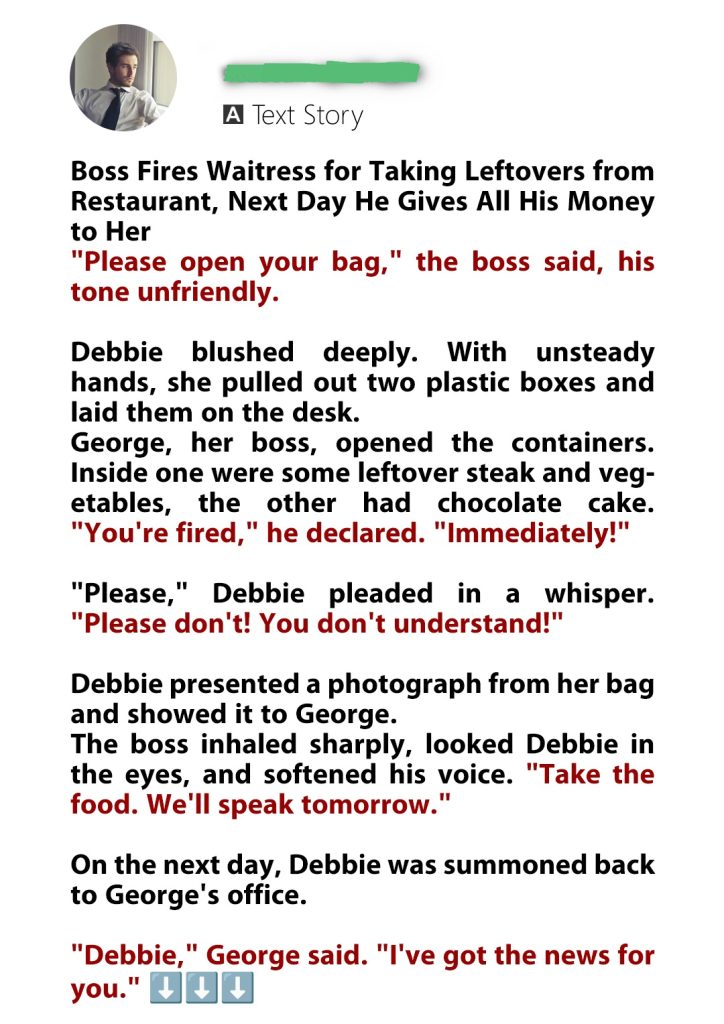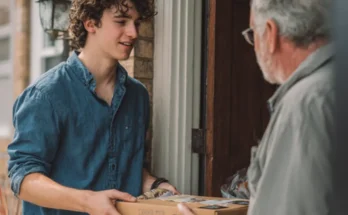George ran his restaurant like a metronome—precise, unyielding, and cold. He liked rules because they kept his kitchen perfect: no free meals, no staff food outside scheduled breaks, and absolutely no taking leftovers home. “Waste is a cost,” he would say, tapping the ledger with a polished fingernail.
Lina had learned to glide through his temper the way she glided between tables—soft voice, quick smile, memorizing orders like poetry. That night she boxed two untouched steaks and a slice of chocolate cake a couple had paid for but barely touched. The busboy was already reaching for the trash. She hesitated, then slipped the boxes into her tote.
George stepped from the office like a shadow pulled by the sound of cardboard. “Open the bag.”
Inside, the smell of peppercorn and cocoa bloomed. George’s jaw hardened. He fired her in the middle of the hallway, not quietly, and added that her final check would be docked for the “theft.” Lina breathed in, as if trying to inhale courage, and left without arguing. The busboy watched the trash can swallow another tray of food.
On his way home, George saw Lina again—at the bus stop in the rain, handing one box to an elderly man with a shopping cart lined in plastic bags, and the other to a kid crouched beside a laundromat, feeding slices of cake to a little sister who clapped at each bite as if it were fireworks. George’s car idled at the light long enough to turn green twice.
Sleep didn’t find him. At three in the morning he unfolded a box he kept beneath his bed: his mother’s things—worn photographs, a church bulletin, a napkin with faded handwriting. He’d forgotten the note, the way grief erases the inconvenient angles of memory:
“Georgie, I brought home tonight’s leftovers. Don’t be ashamed. Food belongs with the hungry.”

His mother had worked double shifts and smuggled spare rolls in her sleeves. He had eaten those quiet rescues and grown into a man who threw food away to keep a rule straight.
When morning blued the windows, George unlocked the restaurant and called his lawyer, his accountant, and then Lina. She arrived wary, damp shoes squeaking on tile. He didn’t make her sit. He slid a folder across the counter—papers transferring ownership of the restaurant and a bank letter naming her as beneficiary of his savings, with instructions to convert the space into a community kitchen and train program. He kept one request: “No one leaves hungry.”
Lina shook her head, eyes wide. “Why me?”
“Because you remembered what I forgot,” George said. “You understood the point of food.”
Word spread. The dining room lost its white tablecloths and gained long wooden tables. The menu kept the peppercorn steaks, but now there was a sliding scale and a line of volunteers where the reservation book used to be. George stayed on to chop onions and keep the books until Lina learned the rhythms, until the kitchen could run without him.
Some nights, when the last pot drained and the floor gleamed, Lina would tuck leftover slices of cake into paper boxes. She’d hand one to the kid from the laundromat, another to the bus driver finishing his route. She always left one on the back counter for George, who never took it home. He ate it standing up, smiling, as if tasting an apology that had finally found its way to the right table.


